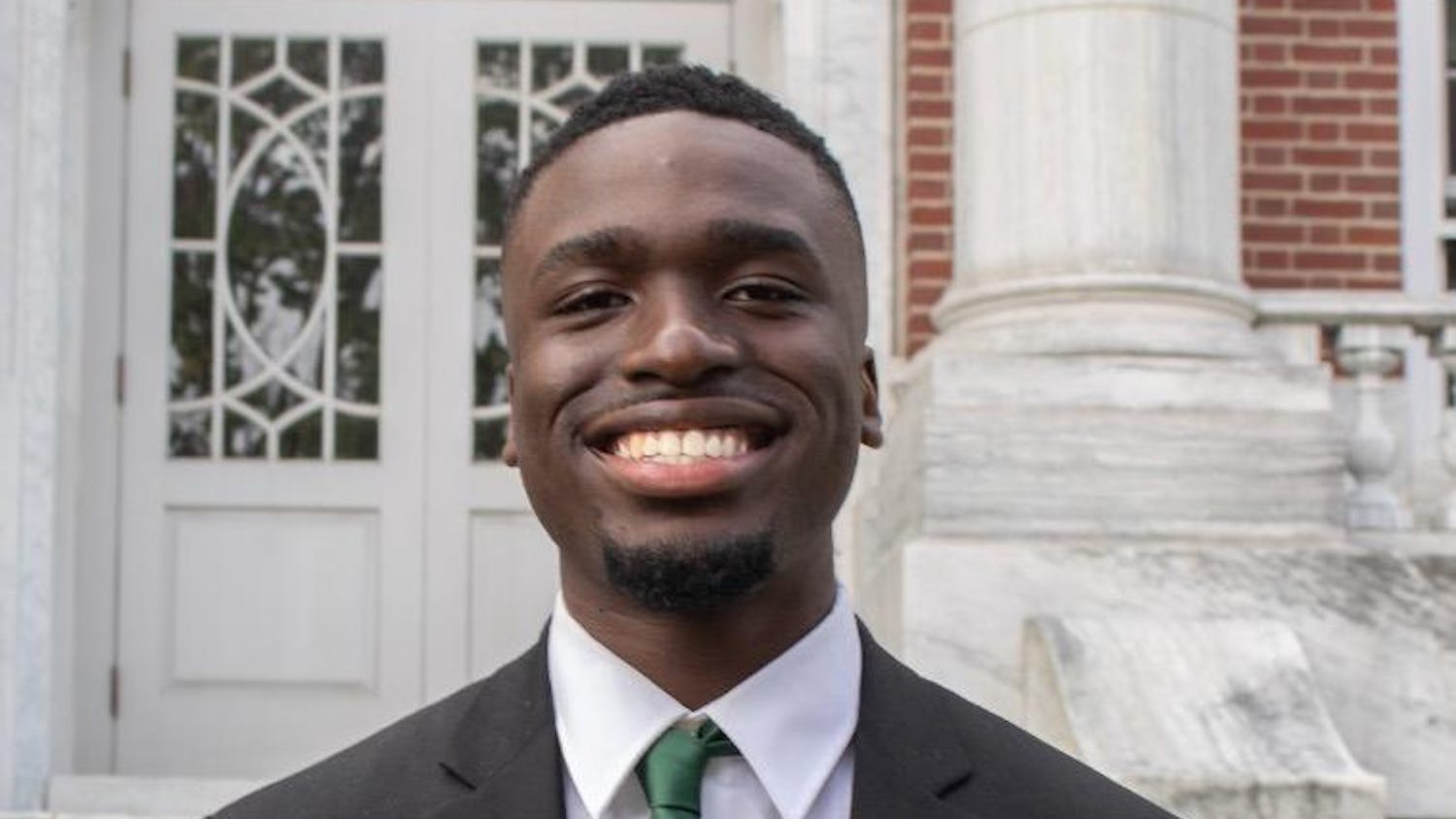Students and alumni recently formed Sack Sackler, a new student group calling for Tufts to cut its ties with the Sackler family. The group held a meeting on April 3 to begin discussing plans. As part of its ongoing efforts, the group also staged a speak-out at the Cannon on Tuesday evening for members of the Tufts community to voice thoughts, frustrations and personal experiences with the opioid crisis.
The first part of the April 3 meeting focused on discussing the general situation and more information about the Sackler family, according to Nathan Foster (LA '18), a spokesperson for Sack Sackler. The group plans to put pressure on the Tufts administration to make the results of the independent review being carried out by Donald K. Stern public, which was announced in a March 25 message to the Tufts community from University President Anthony Monaco.
“[We want] Tufts to fund opioid treatment programs and other ways to pay back survivors for our connections to the Sacklers and then [put] standards in place to prevent future donors from taking advantage of Tufts like this,” Foster said.
Julia Zubiago (LA '18, M '19), one of the students coordinating Sack Sackler efforts, said the group hopes to spread awareness throughout Tufts' campuses about this issue. She emphasized the group’s intention of pushing the administration to remove the Sackler name from the Medical School building at 145 Harrison Ave. in Boston and noted the group already has a petition circulating amongst the Tufts community pushing for this and other demands.
“This movement was formed [because] it is horrible that Tufts took money from the Sackler family,” Zubiago, an MPH candidate in the School of Medicine, told the Daily in an electronic message. “The Sacklers precipitated the opioid crisis by lying- they told doctors that OxyContin wasn’t addictive when they knew that it was, and profited off the opioid crisis that followed overprescription. For all those who are in recovery, for those who still use opioids, and for those who didn’t survive the crisis, we believe Tufts needs to disaffiliate from the Sackler family.”
Foster said that Sack Sackler plans to deliver their petition to the Tufts administration in the near future.
“We’re thinking about in what capacity … in particular because our petition, the medical student petition, the [Tufts Community Union (TCU)] Senate resolution [and] the Faculty Senate resolution all call for a fair and transparent investigation," Foster said. “Which is patently not what is going to happen [given] that the findings of the investigation are going to be kept secret. We are considering delivering it in a way that brings that up.”
Zubiago believes it is ridiculous to have a health professions campus named after a family who has caused an “empire of pain.”
The health professions campus, however, consists of multiple buildings, schools and institutes, according to Executive Director of Public Relations Patrick Collins. This includes the medical education building and the Sackler School of Graduate Biomedical Sciences, which both carry the Sackler name.
“In both cases, those naming gifts were given to the University nearly two decades before OxyContin was introduced to the marketplace,” Collins told the Daily in an email. “The University takes the concerns that have been raised very seriously and looks forward to the findings of Attorney Stern’s review.”
An email to the Daily from Purdue Pharma Executive Director of Communications Robert Josephson reiterated Purdue’s support for pain research at Tufts, saying that such collaboration between academic and industrial communities is both common and appropriate.
“Purdue acted properly at all times in its interactions with Tufts,” Josephson told the Daily in an email. “We respect, and are prepared to assist, the University’s ongoing internal review.”
Sack Sackler formed upon learning how extensive Tufts’ ties with the Sackler family ran, uncovered in the case brought about by Massachusetts Attorney General Maura Healey, Foster said.
“We need to understand the full extent of Tufts’ connections to the opioid crisis,” he said. “We need that information to be public. And we need to figure out a way to do the best we can to make up for at least some of it.”
At yesterday's speak-out at the Cannon, Sack Sackler intended to create a space for those affected by the Sackler family and the opioid crisis to tell their experience, according to Foster.
“The main goals are to provide a space for people to speak if they would like to about how the opioid crisis has affected them or people they know,” Foster said, acknowledging the impact of the crisis. “So many people at Tufts and the United States have been affected by the opioid crisis and we really want to center on those voices."
While painting the Cannon with statements reading “Sack Sackler,” “400,000 dead” and “$13B,” community members shared stories of family members and loved ones impacted by the opioid crisis.
Shane Woolley said he came to the event because he is upset and has personal ties to the crisis.
“I am here tonight because I have very close family members who have been directly affected by the opioid crisis. They struggled with addictions that were brought on by the exact aggressive marketing tactics that the Sacklers used to make billions of dollars for themselves,” Woolley, a senior, said. "When I heard that Tufts was complicit in [this] ... I was incredibly upset and angry and just wanted to make sure that we found a way to resolve this and that Tufts paid for their complicity in their crime."
Zubiago said that the speak-out was a chance to reflect on the deep impact that the Sacklers and the opioid crisis that they have been accused of perpetuating has had on individuals.
“We recognize that the Sackler family's impact on Tufts and its community is not only academic, but deeply personal, and [we] want to honor that by giving people a space to speak about their own feelings,” Zubiago said.
Foster also called for making Tufts a place where donors and administrators are held to the same standards of upholding community values and contributing to efforts strengthening them. He said this has been the results of a failure of governance.
“That means that we need to think about how to change governance in the future to prevent this kind of failure from happening again,” Foster said. “Including things like a review board for publicly disclosing donors, that sort of thing.”
Zubiago shared Foster’s desire for increased transparency surrounding donor information. She called Tufts taking money from a family that has fueled the opioid crisis to fund a health professions program a conflict of interest.
“We’re learning to treat people for the [substance use disorders] that the Sackler’s behavior increased,” Zubiago said. “In science research, financial conflicts of interest must be disclosed. We don’t think it’s too much to ask that academia is held to the same standard.”
Collins reiterated that the university is awaiting the results of Stern’s investigation before making any definitive decisions.
“We think it’s important for the University to have a complete understanding of the roles and potential influence that Purdue Pharma and related parties had in our programs so that any actions we take are fully informed,” he said.
In an interview with the Daily, Foster dismissed the idea of an investigation in the context of it providing the necessary information to cut ties. He said that lobbying the Massachusetts General Court to fund stronger opioid treatment programs could be done regardless of what an investigation yields.
“Changing the name [of the buildings], whatever the legal ramifications, is something that we can do and we can do it regardless of what the investigation finds,” Foster said. “And we need to do it regardless. In terms of the investigation, I’m glad it’s happening.”
Sternhas been on the board of Aegerion Pharmaceuticals since 2015 and now serves on the board of its parent company, Novelion Therapeutics. Aegerion was fined $40 million for making false and misleading statements about one of its drugs in 2017.
In an email to the Daily, Collins noted the alleged conduct brought to light by Foster occurred prior to Stern’s appointment to the board at Aegerion. However, according to the Department of Justice's press release about the fine and Novelion's website, there were actually four months of overlap in the conduct and Stern's term on the board between his appointment in September 2015 and the end of that year.
Regardless, Collins rejected the notion that Stern was related to the misconduct or that this could influence Stern's work with Tufts.
“Any suggestion that Mr. Stern’s role on this corporate board undercuts his qualifications to perform the review that Tufts has requested is simply inaccurate. To the contrary, Mr. Stern’s role there appears wholly consistent with his work on behalf of Tufts—to independently assess prior conduct and, if appropriate, make recommendations for action and change,” Collins said. “So, any suggestion that he oversaw misconduct while on the board is factually wrong. It was the exact opposite.”
Foster also expressed concerns over the findings of the investigation being kept secret, however, in light of the TCU Senate, the Faculty Senate and hundreds of Tufts students calling for a transparent investigation. He called Tufts ignoring these voices “problematic.”
Collins reiterated the gravity with which Tufts takes matters surrounding the Sackler name.
“[This] is why we are the only institution of which we are aware that has taken the step of authorizing an independent, unbiased review of these issues,” he said.
Sack Sackler calls on Tufts to cut ties with Sackler family

The Arnold Wing of the Tufts University School of Medicine is pictured.





